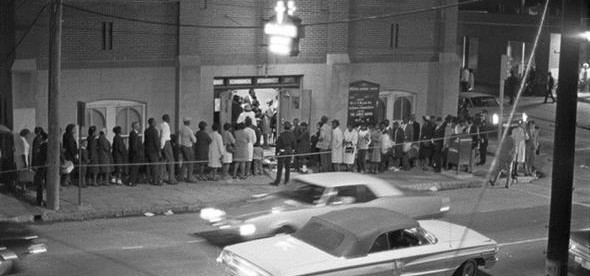The Weekender, January 13, 2017

1) “How a KGB Assassin Used the Death of His Child to Defect ” (Politico, 16 minutes, January 2017). The subhead: “Bogdan Stashinsky was forced to work for the KGB against his will and became one of the most wanted assassins in the world. This is the story of how he put it all on the line to escape. ” Here’s a slightly abridged version of how the story opens, and it’s gripping:
The story of Stashinsky’s defection from the KGB—which has never before been told in such detail—started when he fell in love with Inge Pohl, an East German woman, in the spring of 1957. [ . . . ] Stashinsky probably knew that his work for the KGB would make his marriage to Inge difficult. He argued with his bosses over his desire to propose to a non-KGB-employed, non-Soviet woman. They tried to dissuade him, citing her lower social status and her German nationality; they gave him a new assignment in Moscow, offered to pay Inge a cash settlement—but Stashinsky was still not dissuaded.
Eventually, Stashinsky settled on an agreement with his KGB superiors: He could marry Inge, but she would have to acquire Soviet citizenship. She would also have to agree to help him in his KGB work. The KGB’s logic was simple. If Stashinsky would not marry a Soviet woman in service to the KGB, then his German wife would have to become a Soviet citizen and join the KGB.
Stashinsky was taken aback by the proposal—these conditions would make the marriage a trap for him and his fiancée, not a psychological escape from the embrace of the KGB. Nevertheless, it was the best he could get under the circumstances, and he was not going to let it slip through his fingers. But the KGB grew ever more suspicious as it eavesdropped on the newly married couple and heard them expressing criticism of the Soviet system. The KGB would not allow them to travel abroad together, and it prohibited Stashinsky from visiting Inge in East Berlin, where she had traveled to give birth to their son. But suddenly things changed. A family tragedy was about to crush the young couple, while presenting them with the opportunity they long dreamed about—to escape the embrace of the KGB and start a new life for themselves in the West.
2) Sponsored: Get Matched With The Perfect Wine: Winc is upgrading the way you discover & buy wine. They are eliminating the guesswork by matching you with personalized wine recommendations. Answer six simple questions about what you like to eat and drink and Winc will match you up with wine you are guaranteed to love. Take the quiz and get $20 off your first order of wine!
(Really, this is a pretty great offer. They sent me four bottles for free, which I shared with some friends — my friends, who drink more wine than I do, all were pretty impressed. Assuming I did the math right: If you buy the minimum three bottles, you can get three for about $32 with the discount but have to pay for shipping. If you buy four, shipping is free and it comes out to about $36.)
3) “Funeral” (Atlanta Magazine, 33 minutes, April 2008). The subhead: “An oral history of the remarkable behind-the-scenes effort to stage Martin Luther King Jr.’s 1968 funeral and keep peace in Atlanta while 110 other cities burned.”
4) “The Elvis Impersonator, the Karate Instructor, a Fridge Full of Severed Heads, and the Plot 2 Kill the President” (GQ, 35 minutes, September 2013). This one is PG-13, maybe even R. Or worse. So, use discretion. The section below, for example, has a poop joke in it — and that’s tame for the article. (Thanks to reader Aron P.)
On the ninety-mile ride to the jail, [Kevin] Curtis begs to know what he is supposed to have done. The G-men will not tell him. They do not say a word about ricin or Obama. They offer up no clue as to why an army descended on his neighborhood.
In Oxford, Kevin spends three hours chained to a chair in an empty interrogation room before anyone so much as speaks to him. After a time, he is in need of the commode. “Three agents walk me to a restroom, open the stall, and they say,’I know it’s uncomfortable, but we have to watch you have a bowel movement.’ I say, ‘You gonna wipe me, too?'”
Late in the evening, the interrogation begins in earnest. Kevin is told, untruthfully, that a young girl is “clinging to life in the Tupelo hospital” because of what he’s done. One of the agents summons tears over this fiction. “They say, ‘You want her death on you? You tell us what was in there,'” Kevin recalls. “I’m like, ‘What was in what?’ They won’t tell me. They want me to say it.”
[ . . . ]
At the end of a seven-hour grilling, the agents are beginning to suspect that they’ve picked up the wrong man. “Finally, they know they aren’t getting anywhere, and they ask me, ‘Do you have any enemies? Do you know of anyone who wants to harm you?’ I say, ‘Yeah, Everett Dutschke.'”
WeekenderAdUnits
5) “Meet Henry Orenstein, the Man Who Changed How the World Plays” (Newsweek, 26 minutes, December 2016). The bad news: this article auto-plays a video, so turn your sound off. The good news: the story is fascinating. Henry Orenstein survived the Holocaust by lying about his background, claiming to be a mathematician, and was pulled into a German program to build a super-weapon. And then, after the war, he ended up reinventing the toy business. A great tale about a complicated life. (Thanks to reader Anna D.)
6) “How Many of Your Memories Are Fake?” (The Atlantic, 12 minutes, November 2013). There are people out there with something called “Highly Superior Autobiographical Memory” — the ability to recall even the most mundane details of our lives (like what we had for breakfast on a specific day dozens of years ago). Those memories are recalled clearly and confidently. But are they real?
Have a great (long) weekend!

